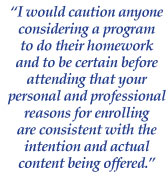By: Derrick Chevalier

According to Financial Times (May, 2013) open executive education’s top 70 schools in United States include Duke, Harvard, University of Michigan and Columbia. Customized executive programs include UCLA, Boston, University of Texas at Austin and Washington University among a number of programs and institutions around the globe.
Interestingly any number of resources indicates that while enrollment in traditional multi-year MBA and Executive MBA (EMBA) programs is decreasing; enrollment in shorter open and customized executive education programs is on the rise.
There are many reasons for this but the leading influencers have to be three factors: Cost, Time and Return on Investment (ROI). The cost for an EMBA can range from below fifty-thousand to as much as seventy-thousand or more depending on where one decides to go. These programs can take anywhere from eighteen to twenty-four months on average and the ROI is incredibly  diverse and difficult to measure with any accuracy. In some ways the value or ROI depends on the student, on the program, and on which elements one uses to measure the return; personal achievement; increase in compensation; access to opportunity requiring the degree or a combination of these and other factors. diverse and difficult to measure with any accuracy. In some ways the value or ROI depends on the student, on the program, and on which elements one uses to measure the return; personal achievement; increase in compensation; access to opportunity requiring the degree or a combination of these and other factors.
Conversely, shorter open and customized programs require far less time ranging from just one or two days up to as much as 10 days at institutions such as Stanford, USC, UCLA, Wharton and Harvard University. Programs are offered primarily during the summer months when enrollment at the institutions is lower but here again executive education is in a perpetual state of evolution and institutions are finding creative ways to expand their offerings and schedules. Costs range from just a few hundred dollars to as much as ten thousand or more for all inclusive residential programs at places like Stanford and Wharton. ROI again is very diverse and multi-faceted; for some open and customized short courses offer an opportunity for continuing education credit for professional sectors such as real estate, accounting, engineering and law to name a few areas. Open and customized programs also offer an opportunity for participants to attend prestigious institutions that award certificates that often resemble the same types of certificates given to regular full time students upon graduation. Think about it all your colleagues, clients and associates see when they walk into your office is a framed certificate from Harvard, Yale, Stanford, Berkeley or some other prestigious institution hanging on your wall; for some that alone is worth the price of the program.
Given my own experience with executive education I would caution anyone considering a program to do their homework and to be certain before attending that your personal and professional reasons for enrolling are consistent with the intention and actual content being offered; ask questions, talk to others who have attended; visit the program if possible, make inquiries on social networks and with clients, colleagues and/or potential employers before you make a commitment. Many of the best institutions know that potential students will pay just to receive a certificate with their name on it; and the program’s presenters, content and relevance reflect that sentiment. be certain before attending that your personal and professional reasons for enrolling are consistent with the intention and actual content being offered; ask questions, talk to others who have attended; visit the program if possible, make inquiries on social networks and with clients, colleagues and/or potential employers before you make a commitment. Many of the best institutions know that potential students will pay just to receive a certificate with their name on it; and the program’s presenters, content and relevance reflect that sentiment.
Other programs while perhaps not offering the most prestigious certificate may more than compensate by offering truly enlightening content, interaction and tangible take away in addition to continuing education credit and a nifty certificate to boot.

Derrick Chevalier
Harrison-Chevalier, Inc.
213-804-4124

|